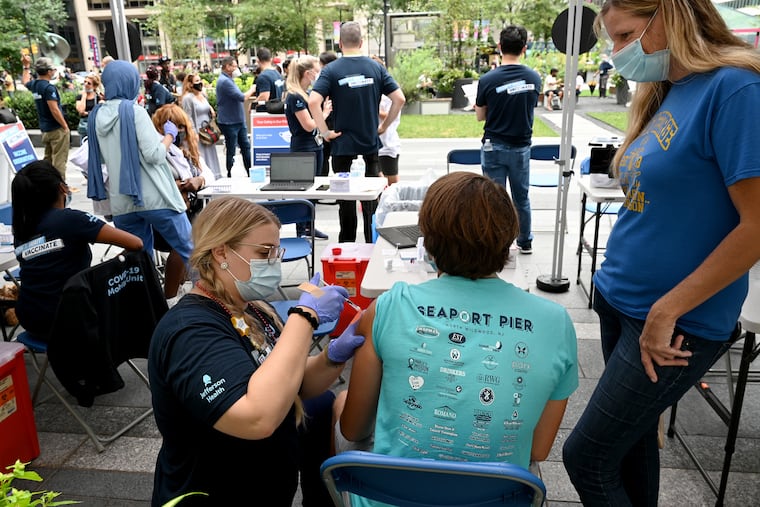Pa., N.J. hospitals are faring OK as other states reach intensive-care unit capacity
With more than 100,000 coronavirus patients hospitalized nationwide, Pennsylvania and New Jersey remain less-hit by the delta surge. Still, cases and hospitalizations continue rising.

As the delta variant ravages other parts of the country, health officials in Pennsylvania and New Jersey are watching with concern the rising number of COVID-19 cases and hospitalizations.
But August ends with both caution and a sense of stability: Pennsylvania and New Jersey hospitals have the capacity to confront the surge if it worsens.
Both were among the 15 states with the lowest hospitalization rates as of Monday and in the top 10 for lowest rate of new cases, according to CDC and New York Times data. The region’s vaccination rates — which are high relative to other states — have protected it from the new case spikes battering Alabama, Mississippi, Florida, and other states, public health experts have said.
Hospitalization counts here remain far lower than they were during the winter surge, before vaccinations were widely available, and when they peaked with about 10,000 people hospitalized with the virus in New Jersey and Pennsylvania.
The Northeast may so far have been less hard-hit by the delta surge, but public health officials are closely watching the incremental rise in hospitalizations, intensive-care admissions, and ventilator use.
Hundreds are being newly infected each day in both states, with average daily hospitalizations the highest they’ve been in weeks and a rising number of patients on ventilators.
New Jersey’s very low rate of coronavirus patients in intensive care provides “little solace,” Gov. Phil Murphy said Monday, “given that we’re at our highest numbers overall since mid-May.”
» READ MORE: More people are getting COVID-19 tests around Philly as delta spreads and worry rises
Intensive-care beds currently available in Pa., NJ
Nationwide, nearly 79% of all ICU beds are in use and 30% of them are filled with coronavirus patients, according to federal data. Alabama has no available ICU beds, and Georgia and Florida are nearly there — and in all three, more than half of the occupied ICU beds are holding coronavirus patients, according to the Department of Health and Human Services data.
The outlook is much better here, with 14% of Pennsylvania ICU beds in use by people with COVID-19 and 6.6% in New Jersey, one of the lowest rates in the country.
In Philadelphia, there were 205 people hospitalized with the virus on Monday, a city spokesperson said, far fewer than the 1,000 that health officials say is the maximum its hospitals can handle. Officials noted Monday the total was a small increase from 190 patients hospitalized a week ago.
» READ MORE: More people in Pa. and N.J. started coronavirus vaccinations in August than in July
After watching virus-related hospitalizations jump between early July and early August, Main Line Health’s four hospitals — Bryn Mawr, Paoli, Riddle, and Lankenau — have seen numbers level off in the last week and have room in their intensive-care units, said interim chief medical officer Jonathan Stallkamp.
At Crozer Health hospitals in Upland, Ridley Park, Springfield, and Drexel Hill, the ICU capacity was not strained, said chief medical officer Gary Zimmer. But after the late summer’s “rapid increase” in coronavirus patients, he added, “we continue to be very concerned about the unvaccinated population.”
Vaccination rates still a concern
The nation’s surge in hospitalizations, and an accompanying increase in deaths, has largely been fueled by the more-transmissible delta variant, which is spreading widely among unvaccinated people. Over the last week, Pennsylvania averaged more than 3,200 new cases a day and New Jersey 2,000, according to an Inquirer data analysis.
Overall hospitalizations have increased in the last week in both states. Pennsylvania hospitals were treating 1,800 coronavirus patients — in the ICU and elsewhere — on Monday, and New Jersey was treating more than 1,000. Most COVID-19 patients were unvaccinated, health officials said.
Crediting the vaccines largely with keeping hospital numbers from rising, health officials have urged the public to get vaccinated and wear masks indoors. Murphy noted unvaccinated people account for the majority of the growing hospitalizations in New Jersey, which grew by 10% over the last week. “If you’re on the fence, look at these numbers,” he said.
Now, while hospitalizations are relatively stable, there’s time for people to get vaccinated and help prevent the surge from worsening.
New cases detected each day have reached May levels in Pennsylvania and New Jersey. The number of ICU patients increased in both states, and the number of people on ventilators increased by 38% in Pennsylvania and 25% in New Jersey over the last week.
“These figures should be a wake-up call to the threat that the delta variant poses,” Murphy said.
» READ MORE: This was supposed to be the return-to-normal school year. It’s going to be anything but.
Some hospital officials said a rise in vaccinations would help keep more hospital beds free.
New Jersey was ranked fifth in the nation and Pennsylvania 10th as of Monday for the percentage of adults with at least one dose, with both states above 80%.
But full vaccination is necessary for the best protection against the delta variant and many remain unprotected, including children under 12 who can’t yet get vaccinated. As of Monday, 55% of all Pennsylvanians and 61% of New Jerseyans were fully vaccinated, according to CDC data.
Doctors urged people to get the shots, which are available from pharmacies and clinics — often without appointments needed — and health-care providers.
“It is safe and effective,” Stallkamp said, “and can help prevent you from ending up in a hospital.”
Staff writers Jason Laughlin, Allison Steele, and Laura McCrystal contributed to this article.